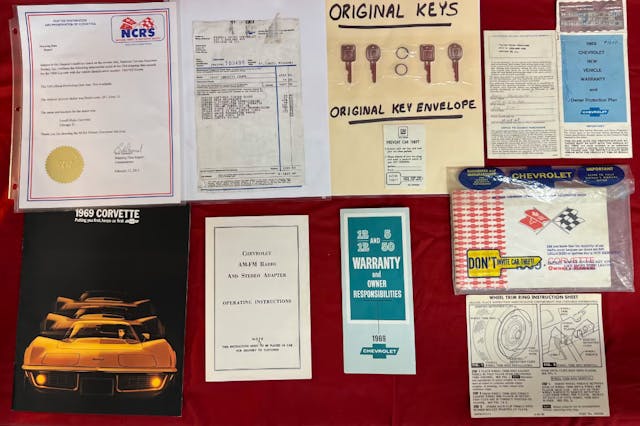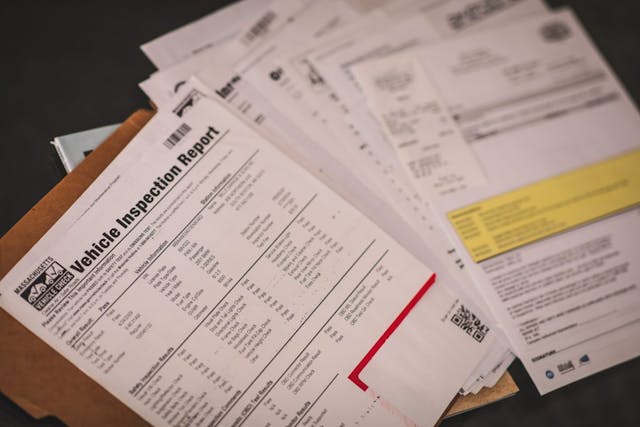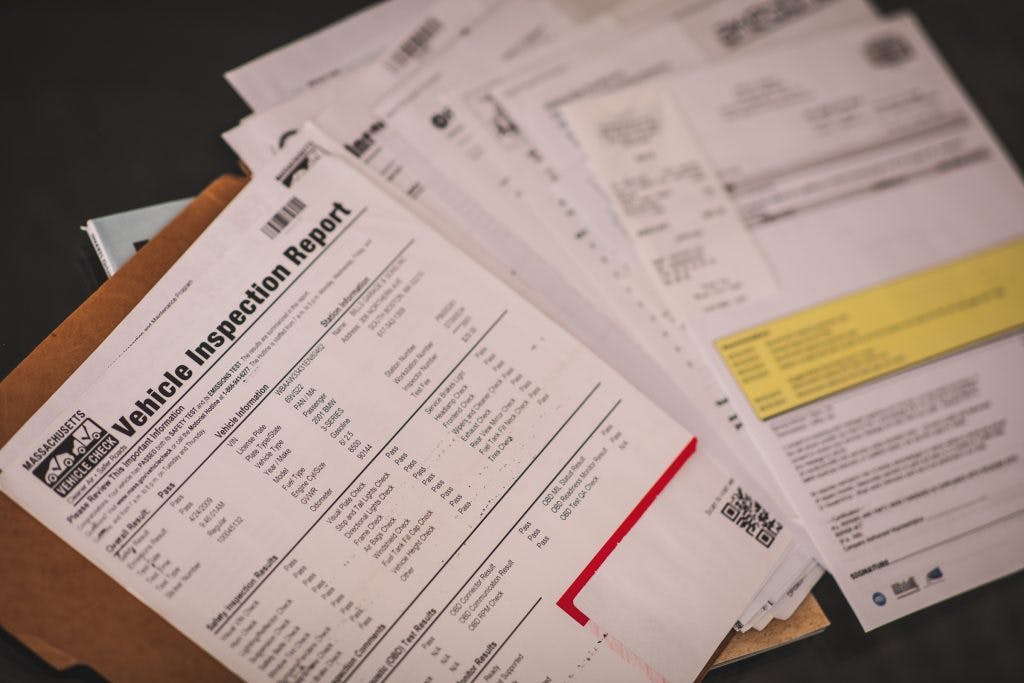Media | Articles
Looking for a winter project? Get your paperwork in order
Dave Kinney, appraiser and publisher of the Hagerty Price Guide is back to answer select questions from readers. While Dave can’t put a value on an individual car in this column (that’s what people pay him to do in his appraisal business, after all), he can field questions about the appraisal process, how to go about buying and selling classics, and the industry as a whole. Have a question of your own for a future article? Ask in the comments section.
With winter now fully upon us, I’ve received several questions from you about what to do until the skies and the roads open back up for driving season in the spring. As I type this, the weatherman in my area says it’s about to snow. If you’re like me, that means I’m not driving anywhere unless I have to, and a hard pass on driving any of the collector cars in my garage. What’s a car enthusiast to do when snowed in?
Here’s my proposal:
Take the necessary time to fix any paperwork issues you may have with any of your cars. Sounds boring? Sure, but it’s important.
Let’s talk about titles. It rarely represents a problem unless you are selling it, but that time will come. You can ignore a transposed digit, an incorrect address, a misspelling or a lost title for a while, but assuming any of those issues will fix themselves is just wishful thinking.
Maybe you have a 1963-1967 Corvette. If you’re familiar with these cars, you already know that over time the middle digit “S” has become a “5” in a decent number of cars.

On older and more obscure cars, it’s not unusual to have a misspelling of a manufacturer’s name, and often one state may use an abbreviation that another might not. I don’t think of Studebaker as a particularly tough name to spell, but looking back over some previous titles, I have had 3 misspells and 4 abbreviations that I’ve had to address with the DMV. Ah, the DMV, the go-to place for rest and relaxation, amirite?
In some States, it goes by other names or initials, like DVS, MVD, BMV, MVA, RMV or even Secretary of State’s office. I’ve counted 15 different names for the officials in charge of issuing titles, and I’m pretty sure there are a few more. Regardless of the abbreviation, though, it’s where you’ll have to go in order to correct this stuff.
So let’s talk about some practical advice for dealing with the DMV in your state. Your car needs a transferable title to sell it—anything less than that is an impairment on the value of your car. Why? Nobody willingly pays for trouble, that’s why. Without a “good” title, your car might be relegated to being broken up for parts in the worst case. If you sell on a Bill of Sale, in many states they might give you a registration, but not a title. In an appraisal, it is stated that the valuer assumes that your vehicle, or group of vehicles has good, marketable title(s). If we are told as part of our assignment that there is no title, or that there is a problem with the paperwork, that will in most every case have a negative effect on the value.
Please keep in mind this is my practical advice only, laws vary by state, and your results may be quite different. And, yeah, don’t try making the title for your Chevette into one for a Corvette, even if you do refer them both as your “Vettes”. That would be breaking the law. Don’t do that.

Back to the DMV. First rule—be nice. Yeah, I know they might be “faceless bureaucrats” or “worker bees” to some, but guess what? They’re real people with their own problems and personalities, and being nice—even when someone is not telling you what you want to hear—costs nothing. I have been standing in line plenty of times when the person in front loses their cool. It never gets them anywhere, except possibly an escorted tour to the exit.
Another tip that has worked a few miracles for me—come back another day and with a better attitude. Or go to a different branch of the DMV. Go midweek, in the middle of the month when most consumer-facing offices are less busy. I like going for a ride to visit with a friend who lives out in the country and then heading to a smaller branch office where the vibe is more relaxed than in the busy suburbs where I live. Is there a privately owned business nearby that will take the titlework to be processed? Not only will they be likely to tell you the time, costs and forms needed, but they are often experts in getting titlework errors processed. Removing your emotions from the effort might be the very best investment you can make.
The second rule is to have the facts at hand. Your problem, such as the “S” that became a “5” in your C2 Corvette, might be easy to document. If every serial number from that vintage follows a certain formula, take a book (with the appropriate page marked) that shows the DMV staffer exactly that. No books or websites to print out or highlight? Try a notarized statement from a national club, and bring a clear photo and rubbing of the serial number for them to see.
Obviously, different jurisdictions have different rules and regulations they must follow, but there are also a lot of judgement calls that the person on the other side of the counter or desk can help you with.
The third rule is to remember a saying a very wise person once told me. “All the rules always apply equally in each instance and always in the same way… Except for when they don’t.”
Fixing the small stuff now will not only make your car easier to sell when that time comes, it will also give you more flexibility when it comes time to market your car. A marketable, no stories title is what any potential buyer wants, and since you’ve got the next couple of months to sort it out, you might as well get cracking.
***
Marketplace
Buy and sell classics with confidence
Check out the Hagerty Media homepage so you don’t miss a single story, or better yet, bookmark it. To get our best stories delivered right to your inbox, subscribe to our newsletters.




I have found that all of these are sound advice when dealing with your DMV (or whatever your local outfit is called) – but especially the “be nice” one. No one behind a counter or desk is in the mood to take your lip (even if you have very valid points). Nor do most of them deserve it (there are always exceptions, of course – but deserved or not, slinging crap at someone is seldom the way to get your point across). I’ve tried to play “reverse situation” role-playing: i.e. – put yourself in their shoes and see if the way you are presenting the issue would make any headway with YOU.
In my state, we have a non-profit organization that will assist you in wading through title/registration problems with the governmental offices. If you flat cannot get yourself into the appropriate mood to deal with the bureaucracy, it might be prudent to let someone else represent you. But remember, no one can help you unless you are at least partially RIGHT. Just thinking you are right and they are wrong doesn’t make it so!
I’m pleasant from the get-go because, lets face it, it;s a day. It’s the people who show up with little or no paperwork and think they can walk out with a new clean title on their lunch hour that’s often the problem. Would you want the job of the people behind the desk at the DMV? Deal with all those..Put yourself in their shoes. Also going directly to your states central DMV office can stream line the procedure. They’re better equipped and more familiar with dealing with these things than a local office. And, believe it or not, not the madhouse you’d expect, quite the opposite from my experience.
This is good info.
I would also add get all the paperwork in order. To add value to your car put together one or two note books on the car.
I have one for documents for the cat. Then I have a second with some documents, information and the history of the car and the care or restoration.
I have document on modifications and how they were done. Where parts came from and all important aspects of the car.
The second book can be used to ad value about the work and parts on the car but also be used at car shows to document important features etc.
I have prototype parts on my car and my note book documents the parts on where they came from and what the intent by Pontiac was.
My other book is mostly ownership documents and repair info. It is more about the ownership and care and that one stays at home.
I got this idea from some of the large concourse shows where they detail the work and history for the judges. My thought is you don’t need to be at Pebble Beach to do the same thing. It also can add valuable info for your car at sale time.
We had a friend who got a job at our local DMV. After about 6 months, the supervisor pulled her aside and told her she probably should look for a different job because she was ” Too nice to work here” True story, Blue Springs, MO
Such a timely article. I purchased a Sunbeam Tiger in 1977 and didn’t notice the VIN number was wrong until sometime after. The VIN was B282000####LRXFC and should have been B382000####LRXFE. Been restoring it, so figured it was time to get it fixed. Took pictures of the VIN plate and all kind of documentation to prove there were no Tigers with VIN’S starting with B282 or ending in C. The FE stands for Ford engine. Figured at least they would have to send a State Trooper out to view the car. After explaining everything to three people. I was finally told they had no record of the title even though I had the original in my hand. Guess after 45 years and the advent of computers things disappear. Good thing I hadn’t lost the title. She didn’t even look at the documentation I had just said she’d be back. When she came back she handed me a corrected title. You can’t imagine how relieved I was. Finally fixed after all these years.
I have a car that I bought in Arizona in 1994. We moved to Ohio for a few years, and when the registration was transferred, someone entered the mileage into the computer as 27,000 miles instead of 127,000 miles (that was in the year 2000). I didn’t notice this until recently when I pulled a CarFax report on my car. It shows “EXCEEDS MECHANICAL LIMITS TITLE ISSUED”.
After reading this article, I assume you would recommend trying to correct this. Is that even possible? Has anyone ever tried to make a correction like this after so many years? Thank you for any comments or suggestions.
Should be no issue. Here in Ohio the titles are handled by the title bureau. They are run by the counties and at least the ones I have here are not a big issue. You may want to contact them to ask what info you need to get the mileage corrected.
I always are amazed at the jokes and complaints of the license and title bureaus as here I can say in my part of Ohio it is no problem.
I just bought plates for a new car the other day and they got me in and out in 8 min.
I just avoid Wednesday as the car auctions are Tuesday and they are busy on the following day.
Excellent advice. We did this last year and fixed four classic car titles with small errors such as calling my ’56 Fairlane Victoria a ’55. Also documented two titles to state that they were actual miles, which I had solid documentation on.
Here in Kansas the Tag Office has a program where you text or call them for a reserved time of your choice. It works slick. No waiting at all. A very pleasant experience with a very knowledgeable clerk.
Paperwork is a good idea. I have a few minor things to look at.
Clean Titles are essential and the process and forms are different in many states. Always good when buying out of state to have Seller provide a Notarized Bill Of Sale on their states BOS form. The price paid and “value” is also dicey and treated different as its used for tax assessment to the resident Seller in some states. In Montana (my home), a Bill of Sale is not needed if there is a clean title of record and they don’t care what you paid for it. I might add that its a good idea to obtain a Certificate of Authenticity, Heritage Registry Certificate or other 3rd party historic marquis registry for your classic. If you have an old Ford your selling, and pull out a “Marty Report”, it just changes the conversation. I watch how industry experts like Dennis Collins, Tom Cotter and other notable classic car appraiser’s spend a lot of time on the paperwork and provenance doc’s. Oh…to have the original factory build sheet for my 66 Mk1a Tiger. Why did these always disappear along with the original tool kit?
My paperwork goals for the winter are more mundane. I’m in the process of summarizing all the maintenance performed on each vehicle since purchase (all of them drivers) into a text file for each, with recent repetitive work outlined, with date, at the top of each file. That way I can easily look up when the brakes were last bled, coolant last changed, trans fluid last drained/filled, diffs, etc. It’s a pain to look through each paper manila folder or my Roackauto record to check receipts, and service I’ve done.
I ran into an issue with my ’57 Dodge D100 when someone out of state was considering buying it. Their state required VIN verification to issue a title but the numbers used to title the truck were the build numbers. Funny thing is it had been bought and sold three previous times in two different states using those same numbers. Ultimately I had to find the Serial (VIN) number on the frame, have a DOT inspector visually verify everything and then a new correct title was issued. Unfortunately the buyer backed out but at least everything’s in order if I ever find a serious buyer.
I put my recently fully restored car back on the road after a 63 year gap in registration. (The people at the license office could not believed that the previous title was ‘typed’, as we have had computer printed ones now since before any of them worked there!)
It was a very difficult process as the VIN for the car and the VIN on the title did not match. Not a case of transposed numbers, but a completely wrong VIN number from a car a year older than mine. I do not know when or how this occurred back in the 50’s but it did and I wanted the VIN corrected for all the reasons stated above. In my area (Ontario, Canada) to do so requires a licensed appraiser to vet the car, supply a form and statement indicating that the title is wrong and should be what is on the car. I supplied all this to the licensing bureau in my town to no avail, so I contacted the appraiser to ask advice. I was directed to the bureau in their town as the license office there know the appraiser’s firm well and know of their integrity.
It worked a treat, the person helping me behind the counter went to bat for me, part of the process required a phone call to head office to get a release that allowed the VIN number change and an approval number which the head office was reluctant to give, whereby the clerk tore a strip of the rep on the other end of the phone and got’er done! It was very satisfying watching a pro tear into another bureaucrat! We all had a good laugh and I had a correct ownership and plates on a car that was last driven before I was born!